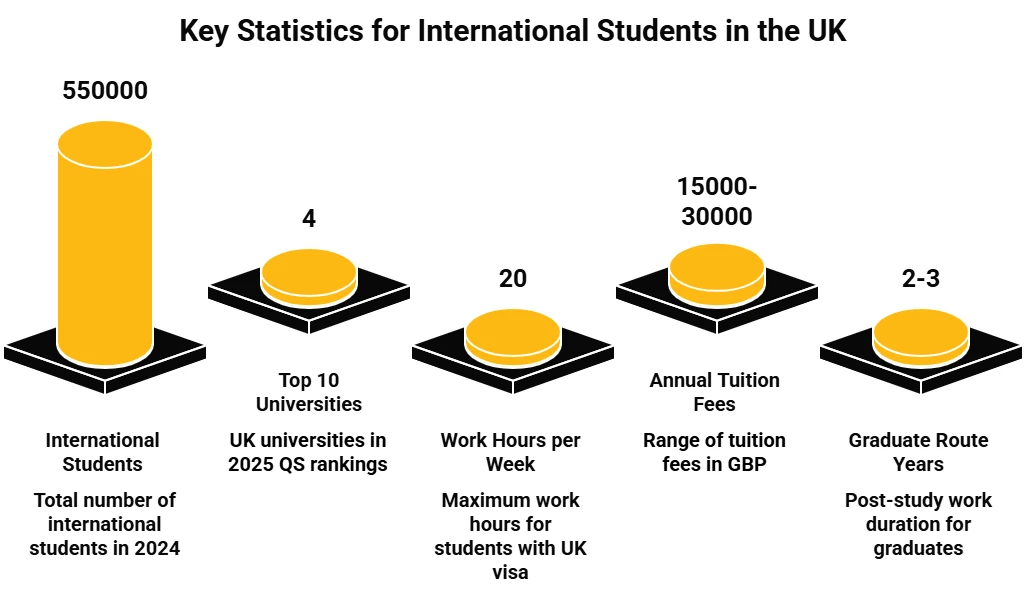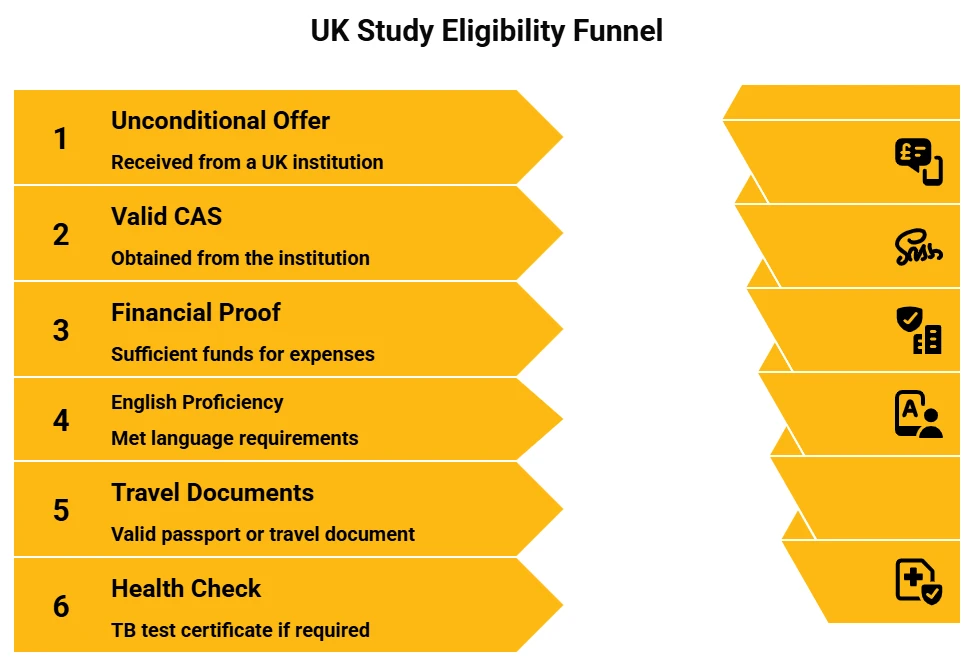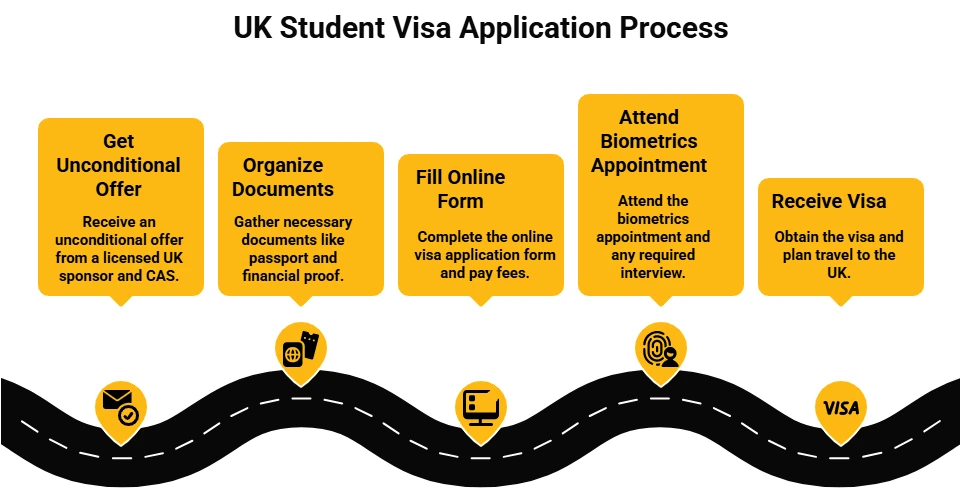Study in UK
Don't know what to do?
Get Free Counseling
Study in the UK – Your Complete Guide for Australian Students
The UK is a sought-after location for higher education because of its respected universities, degrees with international recognition, and lively student culture. Australian students may find the UK appealing because it offers both good academics and chances for careers and immigration.
- In 2024, UK schools had over 550,000 international students.
- In the 2025 QS World University Rankings, 4 of the world’s top 10 universities are in the UK.
- With a UK Student Visa, international students can work up to 20 hours a week while school is in session.
- The tuition fee in the UK will ranges between GBP 15,000 and 30,000 annually.
- The Graduate Route lets qualified graduates stay in the UK and work for up to 2 years (or 3 years for PhDs).

*Want assistance to apply for study in the UK? Sign up with Y-Axis for comprehensive support with the process.
Why Choose to Study in the UK?
For Australian students aiming for globally recognized credentials, the UK is a sound option, blending academic standing with chances for career advancement. Due to its long-standing universities, modern research resources, and degrees respected globally, graduates are ready to compete for jobs in many fields. The UK attracts students because courses are shorter, English is spoken, and the culture is varied. Education and job prospects grow from getting into top-tier academic and career groups.
*Looking for guidance to apply for study abroad? Y-Axis is here to guide you with the process.
UK at a Glance for Australian Students
In the UK, universities usually begin their academic year in September or October, though a few courses also start in January or April. Many students choose to study in cities like London, Manchester, Edinburgh, Birmingham, and Glasgow. The UK is known for its good courses in areas like business, engineering, healthcare, creative arts, and law. If you live in the UK, you can easily use public transport, get student discounts, explore a long history, and experience many cultures. Plus, it's just a short trip to other places in Europe.
What is a UK Student Visa?
For international students, the UK Student Visa serves as the primary path for immigration if they want to study full-time in the UK for over six months. With this visa, you can register at a UK university, college, or school that is licensed, assuming you have a Confirmation of Acceptance for Studies (CAS) from your school. You have to meet the academic and English skills needed, prove you have enough money for schooling and living costs, and sometimes get a tuberculosis (TB) test. The visa also lets you work a bit—usually up to 20 hours a week when school is in session—and work full-time during breaks, but UK Visas and Immigration (UKVI) has rules about that. Also, depending on how long and what level your course is, you might be able to work after you graduate under the UK’s Graduate Route.
Types of UK Study Visas
Detailed information about the various types of UK study visas is given below.
|
Visa Type |
Purpose |
Eligibility |
Duration |
|
Student Visa |
For full-time academic courses at degree level or higher. |
Acceptance from a licensed UK institution, CAS, proof of funds, English language requirement. |
Length of course + up to 4 months after completion. |
|
Child Student Visa |
For students aged 4–17 attending an independent school in the UK. |
Offer from a licensed independent school, consent from parents/guardians, proof of funds. |
Up to 6 years (depending on age and course length). |
|
Short-term Study Visa |
For English language courses lasting 6–11 months. |
Acceptance from an accredited provider, proof of funds, intention to leave after course. |
Maximum 11 months. |
|
Visitor Visa (Short Courses) |
For courses up to 6 months without work rights. |
Proof of acceptance, proof of funds, return travel plans. |
Up to 6 months. |
|
ATAS Requirement |
Additional clearance for certain sensitive subjects (science/engineering). |
Applicable to specific postgraduate or research courses requiring ATAS clearance. |
Matches main visa duration. |
Benefits of Studying in the UK
The benefits of studying in the UK are given below:
- Degrees from top-ranked, globally known universities.
- Lower costs and less time to finish degrees (three years for bachelor's, one year for master's).
- A varied cultural setting with over 500,000 students from more than 180 countries.
- Can work up to 20 hours a week during school and full-time during breaks.
- Chance to work after graduation through the Graduate Route (2 years for most, 3 years for PhDs).
- Good industry ties and chances to do research in many fields.
- Good destination for travel and networking in Europe.

Who Can Apply for a UK Student Visa?
To get a UK Student Visa, students from Australia or other countries need an unconditional offer from a UK school that the government recognizes. They also need a Confirmation of Acceptance for Studies (CAS), must meet English language standards, and must show they have enough money for tuition and living costs. Applicants may also need to meet health requirements, such as a TB test, and prove they plan to study in the UK.
Eligibility Criteria to Study in the UK
The eligibility criteria to study in the UK are given below.
- An unconditional offer from a UK-licensed educational institution.
- A valid Confirmation of Acceptance for Studies (CAS) from that institution.
- Proof of enough money to pay for tuition and living expenses, as required by UKVI.
- Met the English language requirement through a test like IELTS, PTE, or TOEFL.
- A passport or valid travel document.
- A Tuberculosis (TB) test certificate, if needed based on the country you live in.
- No past immigration violations or criminal record that would make them ineligible.

Documents Required for a UK Student Visa
The documents required to apply for a UK student visa are given below:
- A valid passport or official travel ID.
- A Confirmation of Acceptance for Studies (CAS) from your UK school.
- Your academic records, like transcripts and degree certificates.
- Evidence that you meet the English language requirements, usually through tests like IELTS or TOEFL.
- Proof that you have enough money to cover your tuition and living costs, such as bank statements.
- If needed, a Tuberculosis (TB) test result.
- For certain courses, an Academic Technology Approval Scheme (ATAS) certificate.
- If you are under 18, a consent letter from your parents or legal guardian.
Cost of Studying in the UK
Detailed information about the cost of studying in the UK is given below:
|
Expense Category |
Cost Range (per year) |
|
Undergraduate Tuition Fees |
GBP 15,000 – GBP 25,000 |
|
Postgraduate Tuition Fees |
GBP 15,000 – GBP 30,000 |
|
MBA Programs |
GBP 20,000 – GBP 45,000 |
|
Living Costs (London) |
GBP 1,334 per month |
|
Living Costs (Outside London) |
GBP 1,023 per month |
|
UK Student Visa Fee |
GBP 490 (one-time) |
|
Immigration Health Surcharge |
GBP 776 per year of visa duration |
|
Other One-off Costs |
GBP 200 – GBP 500 |
UK Student Visa Processing Time
Detailed information about the processing time for a UK student visa is given below:
|
Service Type |
Processing Time from Australia |
|
Standard Service |
Around 3 weeks |
|
Priority Service |
Around 5 working days |
|
Super Priority Service |
Within 24 hours |
|
Peak Season Impact |
+1–2 weeks |
Scholarships and Funding Options
|
Scholarship Name |
Amount / Value |
What It Covers |
Eligibility Criteria |
|
Chevening Scholarships |
Full tuition + living allowance |
Tuition fees, monthly stipend, travel costs |
Outstanding academic record, leadership potential, work experience, and return to home country after study. |
|
Commonwealth Scholarships |
Full or partial funding |
Tuition, airfare, living costs |
Citizen of eligible Commonwealth country, strong academic merit, and financial need. |
|
GREAT Scholarships |
GBP 10,000 |
Tuition fees |
From eligible countries, strong academic profile, applying for a UK master’s program. |
|
Rhodes Scholarships |
Full funding |
Tuition, living allowance, travel, and personal expenses |
Exceptional academic achievement, leadership, and commitment to service; specific to University of Oxford. |
|
Gates Cambridge Scholarships |
Full funding |
Tuition, living costs, travel, and other allowances |
Outstanding academic record, leadership, and fit with Cambridge program; all nationalities eligible. |
|
Clarendon Scholarships (Oxford) |
Full tuition + living allowance |
Tuition and college fees, annual grant for living expenses |
Academic excellence and potential for postgraduate studies at the University of Oxford. |
|
Edinburgh Global Research Scholarships |
Difference between UK/EU and overseas fees |
Tuition fee differential for PhD students |
Outstanding research potential and acceptance into a University of Edinburgh PhD program. |
|
University of Warwick Chancellor’s International Scholarships |
Full tuition + stipend |
Tuition fees, maintenance allowance |
Excellent academic record, applied for a full-time PhD at Warwick. |
|
Imperial College London Scholarships |
GBP 20,000–40,000 |
Tuition fees and/or living allowance |
Academic excellence, research potential, acceptance into eligible Imperial programs. |
|
UCL Global Masters Scholarships |
GBP 15,000 |
Tuition fees |
International fee-paying students with strong academic results and financial need. |
How to Apply for a UK Student Visa – Step-by-Step
The process to apply for a UK student visa is given below:
Step 1: Get an unconditional offer from a licensed UK sponsor and your CAS.
Step 2: Organize required documents such as your passport, financial proof (for tuition and living costs), English test scores, and TB/ATAS if needed.
Step 3: Fill out the online visa form, pay the fees, and upload your documents.
Step 4: Book and go to your biometrics appointment (and any interview, if required), and quickly respond to any extra requests.
Step 5: Receive your visa (eVisa or BRP), plan your travel, and finish university registration once you arrive.

Can You Work While Studying in the UK?
Yes, international students can work in the UK while studying. International students in the UK who have a Student Visa can usually work while they study, but there are limits set by UK Visas and Immigration (UKVI). If you are a full-time student at a school that is a licensed sponsor, you can work up to 20 hours a week during school time. When the university is officially on break, you can work full-time. You can work at the university or off-site. Some jobs, like self-employment, professional sports, or permanent full-time jobs, are not allowed. These work opportunities give students a chance to get experience, help pay for living expenses, and start building connections in their field as they study in the UK.
Post-Study Work and PR Pathways
|
Pathway |
Duration |
Eligibility |
Leads To |
|
Graduate Route |
2 years (3 years for PhD graduates) |
Completion of a degree at a UK licensed institution with a valid Student Visa at time of application. |
Skilled Worker visa or other long-term work visas. |
|
Skilled Worker Visa |
Up to 5 years (renewable) |
Job offer from a UK-licensed sponsor meeting salary and skill level requirements. |
Indefinite Leave to Remain (ILR) after 5 years. |
|
Global Talent Visa |
Up to 5 years (renewable) |
Recognised leader or potential leader in academia, research, arts, or digital technology. |
ILR after 3–5 years depending on category. |
|
Health and Care Worker Visa |
Up to 5 years (renewable) |
Job offer in eligible health or social care role from a licensed UK employer. |
ILR after 5 years. |
|
Innovator Founder Visa |
3 years (renewable) |
Endorsed innovative business idea and meeting business requirements. |
ILR after 3 years. |
|
Scale-up Visa |
2 years (renewable) |
Job offer from an approved high-growth UK business meeting salary thresholds. |
ILR after 5 years. |
Bringing Your Family While Studying in the UK
Students in the UK on postgraduate courses of at least nine months at a licensed student sponsor can bring immediate family members (spouse/partner and dependent children). Each family member needs to apply for their own visa and prove their relationship to the student. Students also need to show they have enough money to support their family, as required by UKVI. Currently, that's GBP 845 per month for each family member in London, or GBP 680 per month outside London. Family members of eligible students can generally work or study during their stay.
Top Courses for International Students in the UK
Business and Management, Engineering, Computer Science, Law, Medicine, Nursing, Public Health, Creative Arts, and Social Sciences remain among the most popular choices for international students.
|
Field of Study |
Universities Offering the Course |
Popular Study Programs |
|
Business & Management |
• University of Oxford |
MBA, MSc Management, MSc Finance, MSc Marketing, International Business |
|
Engineering |
• University of Cambridge |
Mechanical Engineering, Civil Engineering, Electrical Engineering, Aerospace Engineering |
|
Computer Science & IT |
• University of Cambridge |
MSc Computer Science, Data Science, Artificial Intelligence, Cybersecurity |
|
Law |
• University of Oxford |
LLB Law, LLM International Law, Corporate Law, Human Rights Law |
|
Medicine |
• University of Oxford |
MBBS, Medicine and Surgery, Biomedical Sciences, Clinical Medicine |
|
Nursing & Healthcare |
• King’s College London |
BSc Nursing, MSc Nursing, Public Health, Midwifery, Mental Health Nursing |
|
Creative Arts & Design |
• University of the Arts London |
Fashion Design, Graphic Design, Fine Arts, Interior Design, Animation |
|
Social Sciences |
• University of Oxford |
Sociology, Anthropology, Political Science, International Relations |
|
Education |
• University of Cambridge |
MA Education, TESOL, Educational Leadership, Special Needs Education |
|
Hospitality & Tourism |
• University of Surrey |
International Hospitality Management, Tourism Management, Event Management |
Top Universities in the UK for Australian Students
|
QS Rank (2025) |
University |
Location |
Popular Courses Offered |
|
2 |
Imperial College London |
London |
Engineering, Computer Science, Medicine, Business, Natural Sciences |
|
3 |
University of Oxford |
Oxford |
Humanities, Law, Medicine, Sciences, Social Sciences |
|
4 |
University of Cambridge |
Cambridge |
Engineering, Natural Sciences, Arts, Law, Business |
|
8 |
University College London (UCL) |
London |
Architecture, Law, Psychology, Arts & Humanities, Engineering |
|
15 |
University of Edinburgh |
Edinburgh |
Medicine, Social Sciences, Engineering, Law, Business |
|
28 |
University of Manchester |
Manchester |
Business, Engineering, Computer Science, Social Sciences |
|
35 |
King’s College London (KCL) |
London |
Health Sciences, Law, Arts, Social Sciences |
|
51 |
University of Bristol |
Bristol |
Engineering, Law, Life Sciences, Economics |
|
56 |
London School of Economics (LSE) |
London |
Economics, Finance, Political Science, Law |
|
64 |
University of Warwick |
Coventry |
Engineering, Business, Economics, Computer Science |
Living in the UK as a Student
Being a student in the UK means dealing with both great education and a lively cultural scene, but you'll need to budget and plan carefully. You can live in dorms, rent privately, or stay with a family. Costs change a lot depending on the city; London is the priciest. Students get good public transport, discounts for travel, food, and fun, and free entry to many museums and galleries. Because the UK is multicultural, it’s easy to meet people from different countries. Part-time jobs can help with costs.
Compliance and Responsibilities
If you have a UK Student Visa, you need to meet certain requirements from UK Visas and Immigration (UKVI) to keep your visa valid. You should study full-time at the school that sponsored your visa, go to class, and do well in your studies. You also need to follow the rules about working, like not working too many hours per week and not doing jobs that aren't allowed (like self-employment or professional sports). It's important to tell your university if your contact information changes, keep your immigration documents up-to-date, and apply to extend or change your visa before it expires. If you don't follow these rules, your visa could be cancelled, and it could be harder to get a visa in the future.
How Can Y-Axis Help You?
Y-Axis is leading overseas education and career consultancy that aids students in Australia who want to study in the UK. With skilled advisors and complete support, Y-Axis guides students through the application, visa, and relocation steps.
Our services include:
- Individualized advice on course and university choices.
- Help with applications and documentation.
- Y-Axis Coaching services to help you ace tests for immigration.
- Student visa application help and interview prep.
- Scholarship tips and financial planning advice.
Looking for inspiration
Explore what Global Citizens have to say about Y-Axis in shaping their future
Frequently Asked Questions
